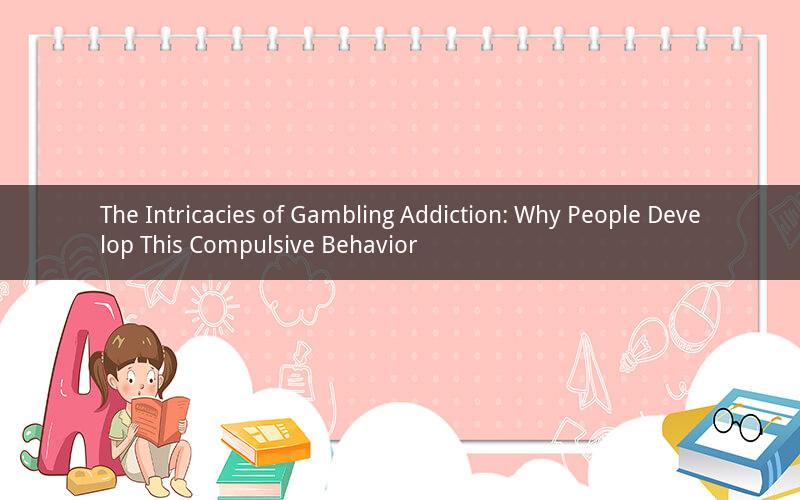
Gambling addiction, also known as pathological gambling, is a complex and insidious condition that affects individuals from all walks of life. It is characterized by an uncontrollable urge to gamble, despite the negative consequences it may bring. In this article, we will explore the reasons why people develop gambling addictions, shedding light on the psychological, social, and environmental factors that contribute to this compulsive behavior.
1. Psychological Factors
a. Thrill-Seeking: Individuals with a high thrill-seeking tendency may be more prone to developing gambling addictions. The adrenaline rush and excitement associated with gambling can be highly appealing to those who seek constant stimulation and excitement in their lives.
b. Impulse Control: People with poor impulse control may find it difficult to resist the temptation to gamble, even when they know the consequences. This lack of control over their behavior can lead to excessive gambling and eventual addiction.
c. Depression and Anxiety: Those who suffer from depression or anxiety may turn to gambling as a means of coping with their emotions. The temporary relief and distraction that gambling provides can make it a crutch for individuals dealing with mental health issues.
d. Low Self-Esteem: Individuals with low self-esteem may turn to gambling as a way to boost their self-worth. The prospect of winning money and the thrill of the game can create a temporary sense of accomplishment and validation.
2. Social Factors
a. Peer Influence: People who are surrounded by individuals who engage in gambling may be more likely to develop an addiction themselves. The pressure to conform and participate in social activities involving gambling can be overwhelming for some.
b. Family Environment: Growing up in a family where gambling is prevalent can increase the risk of developing an addiction. Children who observe their parents or siblings engaging in excessive gambling may view it as a normal and acceptable behavior.
c. Social Status and Prestige: The allure of winning big and gaining social status can be a powerful motivator for some individuals. The desire to be seen as successful and admired by others can drive them to engage in risky gambling behavior.
3. Environmental Factors
a. Accessibility: The ease of access to gambling opportunities can significantly contribute to the development of an addiction. With the advent of online gambling and the proliferation of casinos and gambling establishments, individuals are exposed to more opportunities to gamble, making it easier to develop an addiction.
b. Marketing and Advertising: The aggressive marketing and advertising of gambling products can create a sense of excitement and urgency, enticing individuals to try their luck. The portrayal of gambling as a glamorous and thrilling activity can make it more appealing to potential addicts.
c. Economic Factors: Financial stress and the desire to escape from financial problems can lead individuals to turn to gambling as a means of relief. The promise of quick and easy money can be enticing, especially for those who are struggling economically.
Frequently Asked Questions:
1. What are the signs of a gambling addiction?
Answer: Signs of a gambling addiction include a preoccupation with gambling, feeling the need to gamble more to achieve the same thrill, lying to hide gambling habits, and experiencing negative consequences such as financial problems, relationship issues, and job loss.
2. Can gambling addiction be treated?
Answer: Yes, gambling addiction can be treated. Treatment options include therapy, support groups, medication, and lifestyle changes. The most effective approach often involves a combination of these methods.
3. Is there a genetic component to gambling addiction?
Answer: Yes, research suggests that there may be a genetic component to gambling addiction. Studies have found that individuals with a family history of gambling addiction are more likely to develop the condition themselves.
4. Can a person recover from a gambling addiction?
Answer: Yes, recovery from a gambling addiction is possible. Many individuals have successfully overcome their addiction with the right support, treatment, and determination.
5. How can I help someone with a gambling addiction?
Answer: You can help someone with a gambling addiction by offering support, encouraging them to seek professional help, and being understanding and non-judgmental. It is important to approach the situation with empathy and patience, as recovery can be a challenging process.